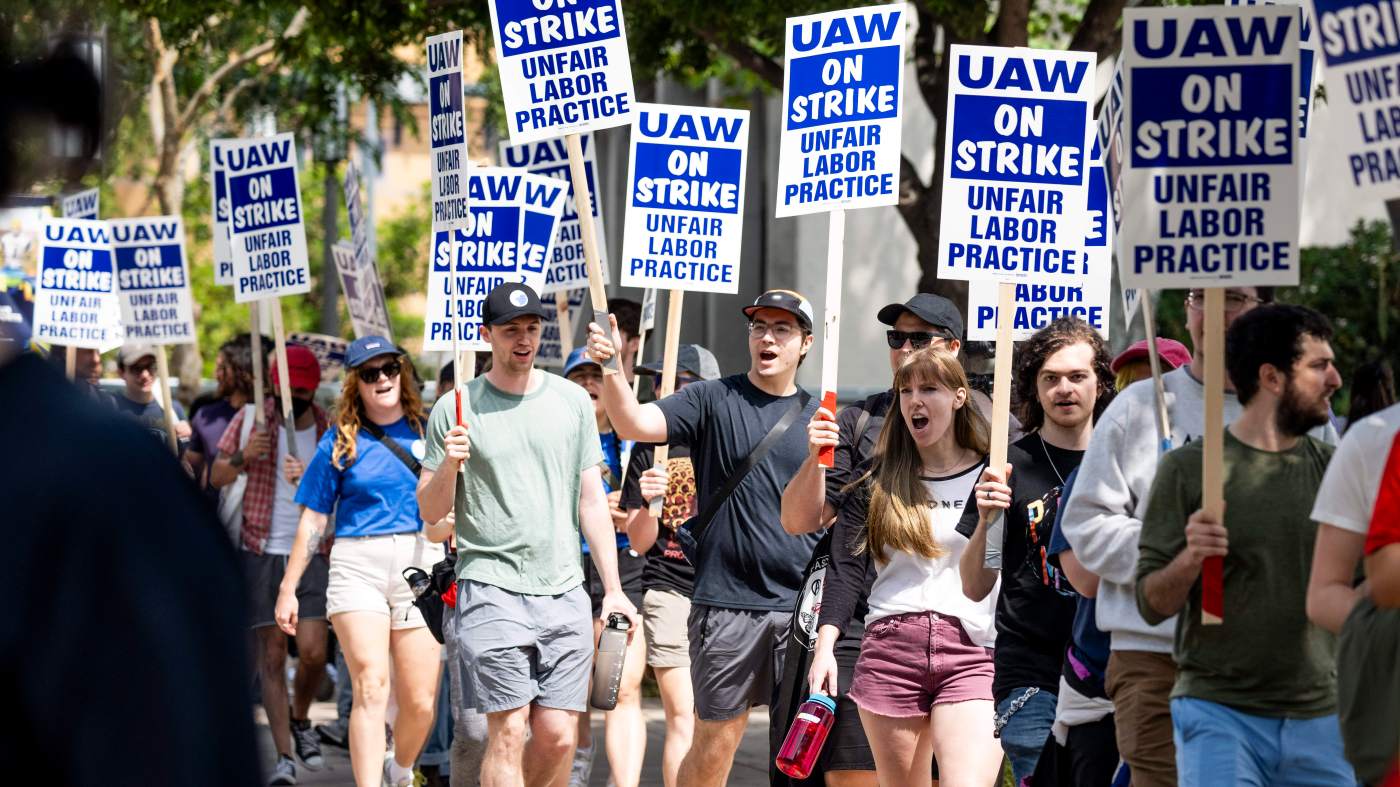Graduate students who work as teaching and research assistants at UC Irvine went on strike Wednesday, joining similar workers at other University of California campuses who say the UC system has violated their collective bargaining agreement by cracking down on pro-Palestine encampments.
The stoppage at UCI is the sixth to hit the UC system since mid-May, with workers also walking out at campuses in Santa Cruz, Davis, Los Angeles, Santa Barbara and San Diego.
The UAW represents 48,000 graduate student workers across the UC system, including about 5,000 student employees at UCI. It is unclear how many in Irvine are participating in the strike and school officials said they won’t have an estimate until payroll data becomes available in about two weeks.
The University of California maintains any efforts to prevent violence stemming from pro-Palestinian protests did not violate the system’s contract with graduate student workers represented by United Autoworkers Union Local 4811. Instead, the UC system claims that the workers, by striking at this time, are in violation of the collective bargaining agreement. Early Wednesday, the University of California system filed a lawsuit, in Orange County Superior Court, requesting a temporary restraining order to end the multi-campus strike.
The lawsuit comes after the UC was denied two requests for injunctive relief by the California Public Employment Relations Board, the quasi-judicial administrative agency charged with administering the collective bargaining statutes covering state employees. In recent weeks, the board has issued complaints against both parties, the UC and the UAW. Complaints are not final rulings.
“Instead of going around PERB in search of a more favorable decision, UC should respect the law, focus on mediation and resolve their serious unfair labor practices,” Rafael Jaime, President of UAW 4811 said in a statement Wednesday.
At various times on Wednesday, about 50 UAW members picketed in front of UCI’s Aldrich Hall and held brief rallies at Science Library and at the site where the encampment was cleared on May 15. The strikers offered chants deriding UCI Chancellor Howard Gillman and against the university administration generally for events that transpired when police and pro-Palestinian protesters confronted each other at UCI on May 15. The conflict led to at least 47 arrests.
Since that incident, pro-Palestinian undergraduate groups and a faculty organization have called for Gillman’s resignation, twice protesting near his home. Meanwhile, the UCI Academic Senate, a governing board of tenured and tenure-track professors, will meet Thursday, June 6, for the second time in a week to discuss Gillman and Provost Hal Stern’s management of the May 15 situation.
Beyond the rallies, school life at UCI didn’t seem to be disrupted Wednesday. Tour guides led prospective students and their families around the campus, as is typical for this time of year. And students, who are slated to take finals this month, zipped to classes on bikes and scooters.
A UCI spokesperson said the university will work to minimize disruption from the strike including preparing instruction and business continuity plans.
But some striking grad workers suggested undergraduates are worried about how the strike might affect grades, finals and their overall academic progress.
“Students are definitely concerned and confused,” said Mark Gradoni, a PhD candidate in Middle East history who works as a teaching assistant and who was among the 47 people arrested on campus May 15.
Though Gradoni won’t formally meet with students while on strike, he said he and other striking teaching assistants worked late into the night on Tuesday to create a study review guide for the class final. “We’re trying our best to communicate with (students) and help them even though we can’t formally do any grading or any instructional work right now.”
Still, while Gradoni worries for his students, he said he also believes the strike and its broader goals aren’t trivial.
“If we don’t know go on strike now and stand up this administration and fight for freedom of speech, freedom of assembly, freedom of academic inquiry — which this university is supposed to be dedicated to — then it doesn’t matter what I want to do in terms of teaching my students. I won’t be allowed to.”
“The time is never good to go on a strike,” Gradoni added. “But sometimes, you have to take that step and you have to stand up. You have to say that we — as academics, as students ourselves, as members of this community and as human beings — will not take this from the university administration any longer.”
Representatives from the UAW said the strike will continue until their claims of unfair labor practices are resolved. They also are asking the UC system to drop charges against students disciplined in protest participations. They say they would like to mediate the situation and are disappointed by the UC system’s decision to file suit.
“They’re implementing every single tactic they can to try to intimidate us,” said Mia Villegas, a trustee on the executive board of UAW Local 4811 and a research staffer at a UCI psychology lab.
“The university knows exactly what they can do to restore justice to our campus as well as to our arrested co-workers,” Villegas added.
“We are advocating that they cure our unfair labor practices by continuing to mediate in good faith with us and to help make sure that what happened on May 15 doesn’t happen again.”





